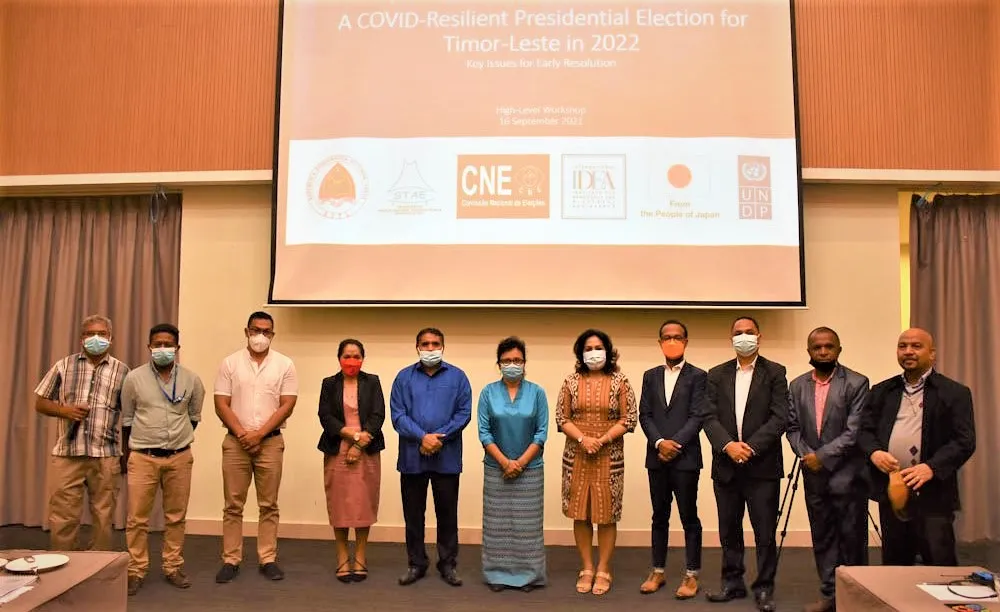Delving Deeper: Expanding discussions on Covid-resilient elections across Timor-Leste

‘Even if you do put special [Covid] measures in place, they still have to preserve the fundamental democratic features of an election that make it free and fair ... and ensure that everyone can accept the result as legitimate.’ Michael Maley at the workshop on Covid-Resilient Elections in Timor-Leste.
Timor-Leste is due to hold presidential elections in the period from March to May 2022, in the midst of what many assume will be the continuing global Covid-19 pandemic. In order to support the safety of these elections, International IDEA, the United Nations Development Programme (UNDP) and the country’s two electoral management bodies (EMBs)—the Technical Secretariat for Electoral Administration (STAE) and National Commission on Elections (CNE)—are implementing the project “Covid-Resilient Elections in Timor-Leste”. Funded by the Governments of Japan and Timor-Leste, a key part of programing under this project is the development of a baseline assessment and recommendations to outline steps that various actors can take across the electoral cycle to support Covid-resilient elections.
With the conclusion of International IDEA and UNDP's workshop on Covid-Resilient Elections in Timor-Leste on 24 August 2021, International IDEA set to work to integrate feedback from its presentation into a newly revised paper, ‘A Covid-Resilient Presidential Election for Timor Leste in 2022: Baseline Assessment and Recommendations’. Understanding the need for expanded collaboration between national partners to ensure safe and participatory elections, the Baseline Assessment is designed to highlight specific Covid-considerations to support STAE, CNE and other relevant ministries across the entirety of the electoral cycle. In order to provide space to present and discuss the recommendations provided, International IDEA and the UNDP hosted a second workshop with an expanded group of stakeholders including high-level representatives from STAE, CNE, the Ministry of Health, the Ministry of Finance and numerous journalists in Dili on 16 September 2021.
International IDEA’s Principal International Expert advising Timor-Leste, Michael Maley was joined by expert colleagues Alan Wall and Augusto Pereira to highlight areas of critical attention ahead of the upcoming elections. Spanning the electoral cycle, recommendations set out within the baseline study aim to inspire the revision of the EMBs’ standard operating procedures and regulations with attention given to ensure that no policy option provided will have a partisan impact or benefit one party over another. Equally, in order to support Covid-resilient elections, recommendations presented are within the capability of administrators to feasibly implement.
Key recommendations presented highlight the EMBs’ strengths and touch on elements such as adequate staffing to implement new Covid-related procedures on election day, the possible move to online systems for candidate presentation, the use of new tools—such as social media and short message systems (SMS)—in campaigning, outdoor polling, expedited counting, increasing the safety of tabulation and areas of consideration around out-of-country voting. In addition, the experts noted the need for adequate training on the new procedures and appropriate messaging across civic and voter education campaigns ahead of the elections.
Recommendations relating to health and hygiene include the continuation of the ongoing vaccination campaign and the full vaccination of all people who will be officially present across the election (including polling station staff, election observers, candidate agents, etcetera), the use of masks, hand sanitizer and protective gloves, temperature taking, the use of one-time nails to mark ballots and the introduction of one-time-use cotton sticks to ink fingers.
Although the constitution and subsequent legal framework cannot undergo a holistic review ahead of these elections, procedures can be put in place to support Covid-resilient elections. Within this however, Mr Maley highlighted that, ‘Even if you do put special [Covid] measures in place they still have to preserve the fundamental democratic features of an election that make it free and fair ... and ensure that everyone can accept the result as legitimate.’
Discussions from across the participants highlighted a general acknowledgement of the need the collaboration between the EMBs, and Ministries of Health and Finance along with other line ministries.
Acilino Manuel Branco, the Director General of the STAE thanked International IDEA and the UNDP for their timely presentations as they prepare for the elections and noted that the information used will support them in adjusting their regulations. Jose A. da Costa Belo, President of the CNE, also noted his continued appreciation of support to the EMB and appreciated both the areas which were found not to apply to Timor-Leste, such as online or postal voting, as well as the continued emphasis on the need for contingency planning and support from a wide variety of partners across the electoral process.
Nilton Da Silva of the Integrated Center for Crises Management noted that a contingency plan with nine ministries and partners has begun which spans the electoral process and includes elements such as continuing the roll-out of vaccines across the country. Importantly, the ministry has committed to continued work with the STAE and CNE, particularly across the campaign and to support personal protection measures such as masking, physical distancing and hand sanitization.
The Chief of Staff of the Ministry of Finance, Jo Monteiro, concluded by acknowledging the potential for the increased cost of the elections as well as the flexibility and time needed to develop supplementary rules and regulations and acknowledged the EMBs’ lead on these.
In this regard, International IDEA is committed to continuing its support to the EMBs and their partners on the development of special operating procedures and revised regulations that account for Covid-specificities and will design and implement specific training programmes to support polling station staff to implement these regulations across election day.



